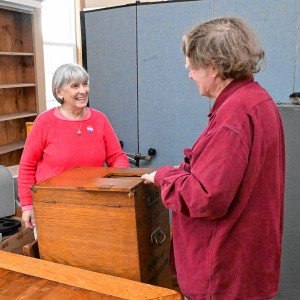Beacon Hill Roll Call: Feb. 26 to March 1, 2024

JO COMERFORD
| Published: 03-08-2024 12:39 PM |
Beacon Hill Roll Call records local representatives’ votes on one roll call from the week of Feb. 26 to March 1. There were no roll calls in the Senate last week.
The House, 154-0, approved a bill that would leverage the interest from the state’s Rainy Day Fund to better compete for federal dollars, to ensure the state receives the maximum possible share of federal funds and to pay down the state’s long-term debt liabilities. The Rainy Day Fund has a historic balance of $8.2 billion.
The Senate already approved a different version of the bill in January. A House-Senate conference committee will likely hammer out a compromise version.
“This legislation expands our commonwealth’s competitive edge as we compete for federal funds and pay down our debt obligations,” said Rep. Jack Lewis, D-Framingham, chair of the House Committee on Federal Stimulus and Census Oversight. “The Bipartisan Infrastructure Act, CHIPS Act and Inflation Reduction Act all contain time-sensitive opportunities for our commonwealth and our local communities — opportunities that require us to have matching resources available.”
“Ensuring that the commonwealth is able to aggressively compete for the federal funding being made available to states is critical, especially given the challenging revenue conditions that we are facing here in Massachusetts this fiscal year,” said House Speaker Ron Mariano, D-Quincy. “It’s vital that Massachusetts does everything that it can to share in that prosperity.”
A “Yes” vote is for the bill.
Article continues after...
Yesterday's Most Read Articles
Rep. Natalie Blais — Yes
Rep. Aaron Saunders — Yes
Rep. Susannah Whipps — Yes
The Senate approved, on a voice vote without a roll call, and sent to the House legislation that would require that all public schools offering a comprehensive sexual health education curriculum to “provide medically accurate, age-appropriate sexual health education.” The Senate has approved the bill four times in the past, including a 38-1 vote by which it passed in 2023. Each time the measure died from inaction by the House.
The Board of Elementary and Secondary Education (BESE) in September adopted updated revisions to local sex education rules that are in line with the changes sought under the Senate bill.
Sen. Sal DiDomenico, the sponsor of the bill, said he supports the revisions adopted by the board, with the backing of Gov. Maura Healey, but noted they are “guidelines and suggestions only.”
“The [bill] turns them into a minimum standard,” said DiDomenico. “It gives teeth to frameworks, and ensures kids aren’t receiving inaccurate and harmful information.”
The bill’s prospects for passage in the House do not look promising this year, given the remarks by House Speaker Ron Mariano, D-Quincy, last week. “Given that it has been less than a year since BESE adopted the new guidelines, it is important that we give school districts adequate time to implement them, rather than rush to potentially amend or codify them into law,” Mariano said.
Under current law, public schools are not required to teach sex education and the bill does not change that but rather mandates that any schools that choose to teach sex education are required to follow a curriculum, based on age, that includes human anatomy, reproduction and sexual development; the benefits of abstinence and delaying sexual activity; the importance of effectively using contraceptives to prevent unintended pregnancy and sexually transmitted diseases, including HIV and AIDS; ways to effectively discuss safe sexual activity; relationship and communication skills to form healthy, respectful relationships free of violence, coercion and intimidation; and information about gender identity and sexual orientation for all students, including recognition that people have different sexual orientations, gender identities and gender expressions.
The measure also requires any school offering sex education to notify parents about the school’s sex education curriculum and gives parents the right to withdraw a student from the instruction. Another provision creates a process for parents to inspect the program instruction materials before the start of the course.
Supporters said that under the bill, local cities and towns still have the authority and power to decide whether sex education is taught in their schools. They said the measure will ensure that schools that choose to teach sex education will have a framework to follow. They noted the bill will prepare students to make healthy decisions and will reduce teen pregnancy and sexually transmitted diseases.
“The [bill] will finally make it clear that sex and relationship education in Massachusetts must be inclusive of all students and emphasize the importance and necessity of consent in relationships,” DiDomenico said. “I am proud we passed this commonsense health policy through the Senate and now we must get it over the finish line to ensure our children have the information they need to protect their health, form respectful relationships and build the bright futures they deserve.”
“Today’s vote affirms what we already know — a strong majority of people in Massachusetts, including most parents, want young people to receive sex and relationship education at school,” said Jamie Klufts, co-chair of the Healthy Youth Coalition. “We look forward to working with the House to pass the [bill] this session so that the state’s exciting new Health and Physical Education Framework can reach its full potential and do the most to support our students and teachers.”
“Providing comprehensive, age-appropriate, and medically accurate sex and relationship education to our youth is the best way to prepare them to make safe and healthy choices,” said Sen. Jason Lewis, D-Winchester, Senate chair of the Committee on Education. “I’m pleased that the Senate is continuing to advance this legislation that ensures that Massachusetts public schools use research-informed curricula that prioritize inclusivity and the health and well-being of students.”
No one spoke against the bill during Senate debate on the proposal but there was opposition from outside the Legislature.
“The bill is government-mandated ideological instruction under the guise of health education,” Catholic Action League Executive Director C.J. Doyle told Beacon Hill Roll Call. “It will use the authority of the law and the money of the taxpayers to impose the value system of the secular left onto the public schoolchildren of the state. This legislation requires sex-ed courses in public schools to include ‘affirmative education that people have different sexual orientations, gender identities and gender expressions.’ That affirmative approach extends, explicitly, to the practice of contraception, and implicitly, to abortion.”
Sam Whiting, an attorney for the Massachusetts Family Institute, told Beacon Hill Roll Call that this bill isn’t about sex education, but sexual indoctrination.
“Parents and school committees don’t want a radically progressive, one-size-fits-all sex education curriculum crammed down on them from Beacon Hill,” Whiting said. “We are optimistic that even though the bill has passed in the Senate, it will again die in the House, as it has the last four legislative sessions.”
The House gave initial approval to a bill that would change some of the language in the current law governing the content of birth certificates. Changes include replacing “both parents” to “parent or parents” and changing “the child’s mother” to “the person who gave birth to the child.”
Current law allows each party to a marriage to adopt any surname, including the present or birth-given surname of either party; retain or resume use of a present or birth-given surname; or adopt any hyphenated combination of names. The bill broadens the options and also allows each party to adopt “any first name, middle name or any other name.”
“Our current birth certificate statute uses outdated language and categories that do not represent the full variety of family structures in the commonwealth,” said Senate sponsor Sen. Becca Rausch, D-Needham. “No child should start out with a government-issued document that fails them. This bill ensures that our birth certificates reflect reality for all Bay Staters, accurately and inclusively.”
“A birth certificate is the first document our government sends us in our lifetimes,” said House sponsor Rep. Dawne Shand, D-Newburyport. “That document should accurately reflect the makeup of our commonwealth’s families and their complexities.”
The House gave initial approval to legislation designating Feb. 4 as Rosa Parks Day “in lasting recognition of a historic civil rights leader.”
“Rosa Parks was a hero of the civil rights movement whose courageous act to challenge segregation kindled and continues to inspire the fight for justice and equality of all peoples,” said co-sponsor Rep. Kip Diggs, D-Barnstable. “Celebrating Ms. Parks on her birthday will make a great addition to Black History Month in the commonwealth.”
Rep. Mike Kushmerek, D-Fitchburg, said he co-sponsored the measure “to bring awareness and representation to the heroic actions of Rosa Parks during the civil rights movement.” Kushmerek noted, “Feb. 4 is the birthday of Rosa Parks, so it will be a strong and persevering reminder to all those within the commonwealth to reflect on the role she played in raising international awareness of the struggles for civil rights.”
The Education Committee has given a favorable report to and recommended that the Legislature approve a proposal that would prohibit public schools from using an athletic team name, logo or mascot that is associated with Native Americans or that denigrates any racial, ethnic, gender or religious group.
“I am pleased the bill was approved by the Education Committee,” said Senate sponsor Sen. Jo Comerford, D-Northampton. “This bill acknowledges the common humanity of all, corrects historical wrongs and addresses the profound psychological harm caused by perpetuating racist stereotypes — harm caused to both people who are of Native American heritage and those who are not.”
The Education Committee has also given a favorable report to and recommended passage of legislation that would require every school district, approved private day or residential school, and education collaborative that enrolls a student with a life-threatening food allergy to develop and implement a Food Allergy Management and Prevention Plan.
The plan would include identifying students with known food allergies, strategies for reducing exposure to allergens and treating allergic reactions. Another provision would require professional development related to food allergies for school staff, including training on epinephrine administration for appropriate staff members.
Supporters said that currently, school districts are not required to have food allergy plans but it is recommended that they do so.
“I’m thrilled that the bill received a favorable report from the Joint Committee on Education and will continue forward in the legislative process,” said sponsor Sen. Cindy Creem, D-Newton. “This bill would help ensure that Massachusetts children with food allergies have safe learning environments, both in the classroom and in the cafeteria.”
The House and Senate each appointed their members of a conference committee that will attempt to hammer out a compromise version of dueling bills that would change some of the state’s gun laws.
The House on Oct. 18 of last year and the Senate on Feb. 1 of this year approved different versions of the measure, leading to appointment of the conference committee.
Sens. Cindy, D-Newton, Joan Lovely, D-Salem, and Bruce Tarr, R-Gloucester, will represent the Senate while the House members will be Reps. Michael Day, D-Stoneham, Carlos Gonzalez, D-Springfield, and Joseph McKenna, R-Webster.
The Senate kicked off Women’s History Month on March 1 with the unveiling of a portrait of former First Lady and Massachusetts native Abigail Adams, the wife of President John Adams and an early advocate for women’s rights and women’s education who also opposed slavery. Adams was an advocate for women’s rights at a time in history when women were barred from voting or holding elected office. Adams famously told her husband, a delegate in the First Continental Congress, to “remember the ladies.”
The portrait, unveiled by Senate President Karen Spilka, D-Ashland, will hang in the Senate lobby.
“Centuries after Abigail Adams told the founders to ‘remember the ladies’ we still have a long way to go to reach full equality when it comes to women’s representation on Beacon Hill,” Spilka said. “Either by accident or design, the many contributions of women who have shaped our commonwealth and our nation have been left out of the art here in the State House. As we celebrate their achievements — and those of the strong women who lead our government today — I am committed to ensuring that the halls of power change to reflect these women. As we unveil Adams, we are taking a meaningful step toward ‘remembering the ladies’ and making it clear that women belong here.”
Spilka also announced the revival of the Senate Art Committee which was established in 1972 but has been dormant for many years, and the appointment of Sen. Julian Cyr, D-Truro, to head the committee. One of the committee’s first orders of business is to solicit nominations from residents for a woman to be honored with a bust in the Senate Chamber. The committee is seeking nominees who have made historic contributions to the state. A website will soon go online to accept nominations.

 No surprises in Wendell election
No surprises in Wendell election Political newcomer defeats Shores Ness for Deerfield Selectboard seat
Political newcomer defeats Shores Ness for Deerfield Selectboard seat New Salem election ushers in new Selectboard member
New Salem election ushers in new Selectboard member Bridge of Flowers in Shelburne Falls to open on plant sale day, May 11
Bridge of Flowers in Shelburne Falls to open on plant sale day, May 11
